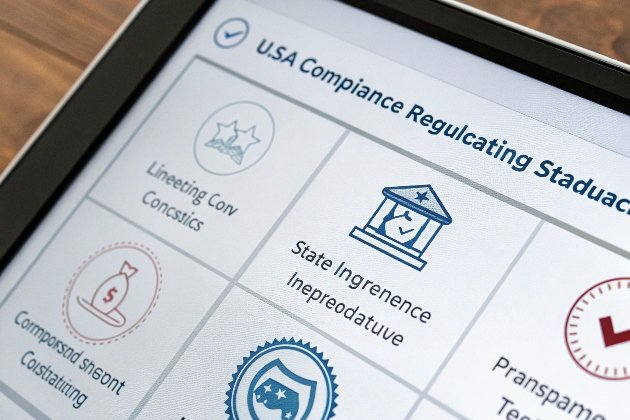Ensuring compliance with U.S. gaming regulations was one of the first challenges I faced when starting out. With every state having different laws, I had to make sure my games met federal, state, and local standards to avoid any legal pitfalls.
When developing custom games for the U.S. market, compliance with gaming regulations is crucial. This involves securing proper licensing, adhering to state laws, conducting independent testing, and ensuring fairness and transparency in gameplay.1
With gaming laws being complex and ever-changing, it’s essential to stay informed and ensure that your games meet all legal requirements before launching them.
Can I Get a Certification That the Game Meets U.S. Legal Standards?
When I first started developing games, I wasn't sure if getting certification was necessary. Over time, I realized that certification from an accredited testing lab is essential for ensuring compliance with gaming laws.
Yes, you can obtain certification for your game by submitting your software and hardware to independent third-party testing labs. These labs will verify fairness, randomness, and compliance with U.S. gaming regulations.2

Steps to Obtain Certification
- Choose an Accredited Testing Lab: The first step is to choose a lab recognized by U.S. gaming authorities. These labs test game fairness, the reliability of Random Number Generators (RNGs), and compliance with specific state regulations.
- Submit Game for Testing: Once your game is developed, it must be submitted to the lab for testing. The lab will assess the randomness of outcomes and verify compliance with U.S. gaming standards.
- Obtain Certification: After testing, the lab provides a certification that your game meets the required standards. This is crucial for legal approval, especially when it comes to regulatory bodies like the U.S. Gaming Commission.
| Step | Action | Details |
|---|---|---|
| Choose Accredited Lab | Find a lab recognized by U.S. regulators | Ensure the lab specializes in gaming testing |
| Submit for Testing | Submit game for fairness and RNG testing | Provide all game components and algorithms |
| Obtain Certification | Receive a certificate of compliance | Necessary for legal operations and approvals |
Through certification, you ensure that your game adheres to U.S. standards and is legally safe to launch.
How Do You Keep Up with Changes in Gaming Regulations?
As a game developer, I’ve had to keep up with constant changes in U.S. gaming regulations. In a fast-evolving industry, staying up-to-date with legal changes is key to maintaining compliance.
I keep up with changes in gaming regulations by working closely with legal experts, monitoring state and federal updates, and conducting regular audits to ensure my games remain compliant.3
![]()
Strategies for Staying Updated
- Legal Consultation: I work with gaming attorneys who specialize in U.S. gaming law. They provide insights on new regulations and ensure that my games meet the latest legal requirements.
- Monitor State-Specific Regulations: Since gaming laws vary by state, I closely follow updates from state gaming commissions to stay informed about new legal frameworks that might affect my games.
- Periodic Audits: Regular audits ensure that my games and business practices align with changing regulations. This includes reviewing licensing, ensuring transparency in RTP, and confirming that no gambling-related mechanics are being used in skill-based games.
| Method | Action | Purpose |
|---|---|---|
| Legal Consultation | Work with gaming attorneys | Ensure games meet updated laws |
| Monitor State Regulations | Track changes in state laws | Adapt games to local requirements |
| Periodic Audits | Conduct regular compliance reviews | Keep operations aligned with current laws |
With these strategies, I ensure my games stay compliant while remaining competitive in a constantly changing market.
Can You Provide Documentation for Legal Compliance?
I understand that legal documentation is crucial when it comes to proving compliance with U.S. gaming regulations. Ensuring transparency not only builds trust with regulators but also with players.
Yes, I provide comprehensive documentation for legal compliance, including licenses, testing reports, and compliance certificates, to ensure that my games meet all legal requirements.4

Types of Documentation for Compliance
- Licensing and Permits: Before launching any game, it’s essential to secure the necessary licenses from state and federal regulators. These documents validate that the game is legally authorized to operate.
- Testing Reports: Certification from third-party testing labs is a critical document that proves the fairness and legality of the game. This includes reports on RNG performance, payout rates, and compliance with state-specific laws.
- Compliance Certifications: These are issued by accredited bodies, confirming that the game adheres to all U.S. gaming laws, including fairness, data protection, and age restrictions.
| Document Type | Purpose | Details |
|---|---|---|
| Licensing and Permits | Validates game authorization | Must be obtained before launch |
| Testing Reports | Proves fairness and legality | Includes RNG testing, RTP verification |
| Compliance Certificates | Confirms adherence to U.S. laws | Essential for legal operation |
These documents ensure that my games are fully compliant with U.S. regulations and can be legally operated in various jurisdictions.
What Should I Be Aware of When Developing Games for U.S. Markets?
Developing games for the U.S. market requires a deep understanding of the legal landscape. During my early development process, I encountered numerous challenges that required me to pay close attention to both federal and state laws.
When developing games for the U.S. market, I need to consider state-specific regulations, obtain proper licensing, and integrate age and access restrictions to ensure compliance.5

Key Considerations for U.S. Market Development
- State-Specific Laws: U.S. states have different rules about what types of games are allowed, especially when it comes to skill-based vs. gambling-like games. It’s essential to tailor your games to meet these local requirements.
- Age Restrictions and Verification: Implementing age verification systems ensures that minors don’t access games. Many states have strict regulations regarding the age of players, particularly in games with real-money elements.
- Responsible Gaming: Including features like self-exclusion, betting limits, and player activity tracking is essential for promoting responsible gaming and ensuring compliance with U.S. laws.
- RNG Certification: As mentioned earlier, using a certified RNG is mandatory for fairness and to meet regulatory requirements.
| Factor | Key Consideration | Action Required |
|---|---|---|
| State-Specific Regulations | Tailor games to meet state laws | Research and follow local laws |
| Age Verification | Prevent underage access | Implement ID checks and age limits |
| Responsible Gaming | Promote safe gaming practices | Include self-exclusion and betting limits |
| RNG Certification | Ensure fairness and compliance | Use certified RNG for randomness |
By addressing these factors, I can ensure that my games are legally compliant and accessible in all U.S. states.
Conclusion
Ensuring compliance with U.S. gaming regulations is crucial when developing custom games. By obtaining proper licensing, staying updated with regulatory changes, and working with legal experts, I ensure that my games meet all necessary legal standards.
Footnotes
1. Learn about U.S. gaming regulations and compliance requirements. ↩︎
2. Understand the importance of third-party testing for game certification. ↩︎
3. Strategies for keeping up with evolving gaming laws. ↩︎
4. How to gather necessary compliance documentation for games. ↩︎
5. Key considerations for U.S. market game development. ↩︎
6. The role of accredited testing labs in verifying gaming fairness. ↩︎
7. Importance of adhering to state-specific gaming laws. ↩︎
8. How RNG certification ensures game fairness and compliance. ↩︎
9. The need for age verification and responsible gaming features. ↩︎
10. Regular audits to maintain ongoing compliance. ↩︎



